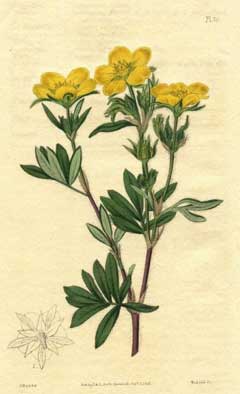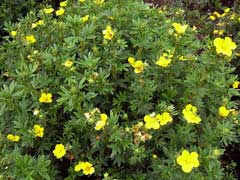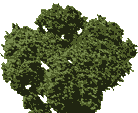 |
|
http://commons.wikimedia.org/wiki/File:Potentilla_fruticosa1.jpg |
 |
| http://commons.wikimedia.org/wiki/User:MPF |
Translate this page:
Summary
Bloom Color: Pink, Red, White, Yellow. Main Bloom Time: Early summer, Early fall, Late summer, Mid summer, Mid fall.
Physical Characteristics

 Dasiphora fruticosa is a deciduous Shrub growing to 1.2 m (4ft) by 1.2 m (4ft in) at a medium rate.
Dasiphora fruticosa is a deciduous Shrub growing to 1.2 m (4ft) by 1.2 m (4ft in) at a medium rate.
See above for USDA hardiness. It is hardy to UK zone 6. It is in flower from June to July. The species is dioecious (individual flowers are either male or female, but only one sex is to be found on any one plant so both male and female plants must be grown if seed is required). and is pollinated by Bees, flies. The plant is not self-fertile.
It is noted for attracting wildlife.
Suitable for: light (sandy), medium (loamy) and heavy (clay) soils and prefers well-drained soil. Suitable pH: mildly acid, neutral and basic (mildly alkaline) soils. It can grow in semi-shade (light woodland) or no shade. It prefers moist soil and can tolerate drought. The plant can tolerates strong winds but not maritime exposure.
UK Hardiness Map
US Hardiness Map
Synonyms
Dasiphora fruticosa. Pentaphylloides fruticosa.
Plant Habitats
Edible Uses
A tea is made from the dried leaves[2, 46, 61, 183, 257, 272]. Used as a substitute for China tea, especially by people living at high elevations in the Himalayas[272].
References More on Edible Uses
Medicinal Uses
Plants For A Future can not take any responsibility for any adverse effects from the use of plants. Always seek advice from a professional before using a plant medicinally.
The leaves are astringent[240]. The juice of the root is used in the treatment of indigestion[272].
References More on Medicinal Uses
The Bookshop: Edible Plant Books
Our Latest books on Perennial Plants For Food Forests and Permaculture Gardens in paperback or digital formats.

Edible Tropical Plants
Food Forest Plants for Hotter Conditions: 250+ Plants For Tropical Food Forests & Permaculture Gardens.
More

Edible Temperate Plants
Plants for Your Food Forest: 500 Plants for Temperate Food Forests & Permaculture Gardens.
More

More Books
PFAF have eight books available in paperback and digital formats. Browse the shop for more information.
Shop Now
Other Uses
Can be grown as a medium size informal hedge[29, 200]. Trim in spring[200]. Some forms, notably 'Longacre', 'Elizabeth' and 'Gold Drop' have a dense spreading habit and make good ground cover plants[197]. A useful plant for controlling soil erosion[158]. The dry, flaky bark is used as a tinder for friction fires[99, 257]. (fires started by rubbing 2 pieces of wood together very fast). The powdered plant is used as an incense[272]. The leaves are used as a packing material in pillows[257].
Special Uses
References More on Other Uses
Cultivation details
Landscape Uses:Border, Foundation, Ground cover, Massing, Rock garden, Specimen. Easily grown in a well-drained loam, preferring a position in full sun but tolerating shade[1]. Prefers an alkaline soil but tolerates a slightly acid soil[200]. Prefers a light well-drained soil[108]. Established plants are drought tolerant[190]. A very cold-hardy plant, tolerating temperatures down to at least -25°c[184]. A very ornamental shrub[1], there are many named varieties[11]. Polymorphic[11]. A good bee plant[108]. Members of this genus are rarely if ever troubled by browsing deer[233]. Dislikes growing under trees, especially Juglans species[18]. Plants are usually dioecious but hermaphrodite forms are also known[182]. Male and female plants must be grown if seed is required. Special Features:
North American native, Attracts butterflies, Attractive flowers or blooms.
References Carbon Farming Information and Carbon Sequestration Information
Temperature Converter
Type a value in the Celsius field to convert the value to Fahrenheit:
Fahrenheit:
The PFAF Bookshop
Plants For A Future have a number of books available in paperback and digital form. Book titles include Edible Plants, Edible Perennials, Edible Trees,Edible Shrubs, Woodland Gardening, and Temperate Food Forest Plants. Our new book is Food Forest Plants For Hotter Conditions (Tropical and Sub-Tropical).
Shop Now
Plant Propagation
Seed - sow early spring or autumn in a cold frame. When they are large enough to handle, prick the seedlings out into individual pots and grow them on in the greenhouse for at least their first winter. Plant them out into their permanent positions in late spring or early summer, after the last expected frosts. Cuttings of half-ripe wood, 3 - 5cm with a heel, July/August in a frame. Pot up in the autumn if possible and overwinter in a cold frame[78]. Softwood cuttings taken in the early summer[11, 113]. Easy.
Other Names
If available other names are mentioned here
Native Range
TEMPERATE ASIA: Russian Federation (Buryatia, Gorno-Altay, Hakasija, Respublika, Tyva, Respublika, Yakutia-Sakha, Altay, Krasnoyarsk, Taymyr, Chita, Irkutsk, Tyumen), Kyrgyzstan, Mongolia, China (Gansu Sheng, Hebei Sheng, Heilongjiang Sheng, Jilin Sheng, Liaoning Sheng, Nei Mongol Zizhiqu, Shaanxi Sheng, Shanxi Sheng, Sichuan Sheng, Xinjiang Uygur Zizhiqu, Xizang Zizhiqu, Yunnan Sheng) TROPICAL ASIA: Bhutan, India (north), Nepal, Pakistan (northeast) EUROPE: United Kingdom, Ireland, Sweden, Estonia, Latvia
Weed Potential
Right plant wrong place. We are currently updating this section.
Please note that a plant may be invasive in one area but may not in your area so it's worth checking.
Conservation Status
IUCN Red List of Threatened Plants Status :

Growth: S = slow M = medium F = fast. Soil: L = light (sandy) M = medium H = heavy (clay). pH: A = acid N = neutral B = basic (alkaline). Shade: F = full shade S = semi-shade N = no shade. Moisture: D = dry M = Moist We = wet Wa = water.
Now available:
Food Forest Plants for Mediterranean Conditions
350+ Perennial Plants For Mediterranean and Drier Food Forests and Permaculture Gardens.
[Paperback and eBook]
This is the third in Plants For A Future's series of plant guides for food forests tailored to
specific climate zones. Following volumes on temperate and tropical ecosystems, this book focuses
on species suited to Mediterranean conditions—regions with hot, dry summers and cool, wet winters,
often facing the added challenge of climate change.
Read More
Expert comment
Author
L.
Botanical References
1117200
Links / References
For a list of references used on this page please go here
Readers comment
| Add a comment |
|
If you have important information about this plant that may help other users please add a comment or link below. Only comments or links that are felt to be directly relevant to a plant will be included. If you think a comment/link or information contained on this page is inaccurate or misleading we would welcome your feedback at [email protected]. If you have questions about a plant please use the Forum on this website as we do not have the resources to answer questions ourselves.
* Please note: the comments by website users are not necessarily those held by PFAF and may give misleading or inaccurate information.
To leave a comment please Register or login here All comments need to be approved so will not appear immediately.
|
Subject : Dasiphora fruticosa
|
|
|
|